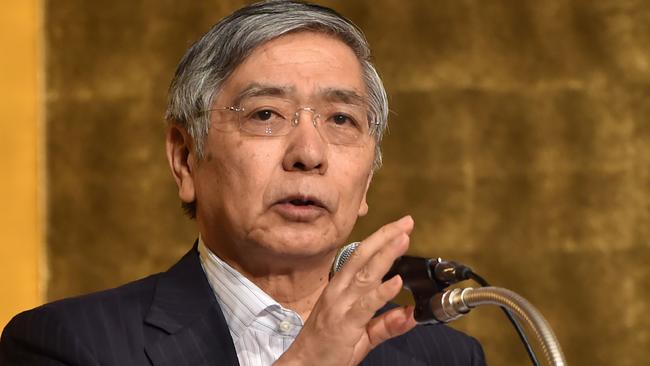Bank of Japan spree ‘distorts’ Reserve Bank rate
The Bank of Japan’s bid to kickstart the Asian nation’s economy is disrupting Australia’s money market.

The Bank of Japan’s trillion-dollar determination to kickstart the Asian nation’s economy is disrupting Australia’s short-term money market, according to the Reserve Bank, with economists concerned that today’s meeting of Japan’s central bank could make things worse.
Japanese investors are using Australia’s short-term secured lending market in a hedging strategy that effectively swaps Australian government bonds for Japanese government bonds, which are in strong demand under the Bank of Japan’s massive quantitative easing program.
In the process, they are distorting rates in the “repo” market, which is the market used by the Reserve Bank to set the cash rate and is also the key market that provides liquidity to trade in government bonds. Traders describe the repo market as “ground zero” for the Australian financial system, given that it is critical way that banks manage their vast balance sheets.
The minutes of the Reserve Bank’s September board meeting, released yesterday, highlighted that the Bank of Japan’s stimulatory policy was having an impact on markets globally.
“The cost of borrowing US dollars in exchange for yen and some other currencies in short-term foreign exchange swap markets had remained elevated,” the RBA minutes said. “This appeared to reflect strong demand from Japanese investor and banks as they searched for yield in the light of the BoJ’s quantitative easing measures.
“The profitability of lending Australian-dollar securities for cash, swapping the proceeds into yen and purchasing Japanese government bonds had pushed Australian short-term secured lending rates higher.”
Since the middle of this year, the repo rate at which the Reserve Bank conducts its open market operations has soared from a spread of two basis points to more than 20 basis points, relative to the overnight indexed swaps, which is the market used by banks to manage their exposure to changes in the cash rate.
Westpac’s head of market strategy, Robert Rennie, said the rise in repo rates was choking demand for Australian government bonds and raising risks for users of both foreign exchange swap and bond futures markets. “You want bond futures to trade in line with the underlying cash market and the foreign exchange basis swap to do the same,” he said. “We saw these basis markets break down during the financial crisis.”
The Bank of Japan has been buying Japanese government bonds at a rate of ¥80 trillion ($1 trillion) a year in an effort to force banks to start lending to households and businesses.
However, Mr Rennie said the effect had simply been to load the banks with cash, which they have failed to lend. He said Japan’s banks were running out of government bonds to sell to the central bank and said the market belief that quantitative easing strategies in Japan and Europe was approaching exhaustion was behind the recent rise in global bond yields.
Markets have been disappointed that the Bank of Japan has not boosted its stimulus in its latest meetings in the wake of continuing low inflation figures and a rise in the value of the yen.
Mr Rennie said he expected today’s Bank of Japan meeting to lower negative rates from minus 10 to minus 20 basis points, to punish the banks for not lending, rather than add to its QE program. The Bank of Japan’s balance sheet is already as large as that of the US Federal Reserve.
The Reserve Bank said that while currency markets continued to be influenced by monetary policy developments in the advanced economies, there had been little change in the yen, Chinese yuan or Australian dollar exchange rates in the past month.
The Reserve Bank appears set to leave rates steady, with the minutes commenting that “the current stance of monetary policy was consistent with sustainable growth in the Australian economy and achieving the inflation target over time”.
The Reserve Bank announced several senior staff changes yesterday. Assistant governor Chris Kent, who has been in charge of its economics department, is taking over the financial markets division, which was run by Guy Debelle before Dr Debelle was appointed deputy governor. It is an appointment that extends Dr Kent’s experience to a key area of the bank’s operations and may eventually make him a candidate for the next generation of the bank’s leadership.
The assistant governor in charge of the financial system, Malcolm Edey, who was a contemporary of Glenn Stevens and considered a possible candidate for the deputy governorship, has retired and will be replaced by Michelle Bullock, who is currently head of business services.
The Reserve Bank is advertising to fill the positions vacated by Dr Kent and Ms Bullock.






To join the conversation, please log in. Don't have an account? Register
Join the conversation, you are commenting as Logout